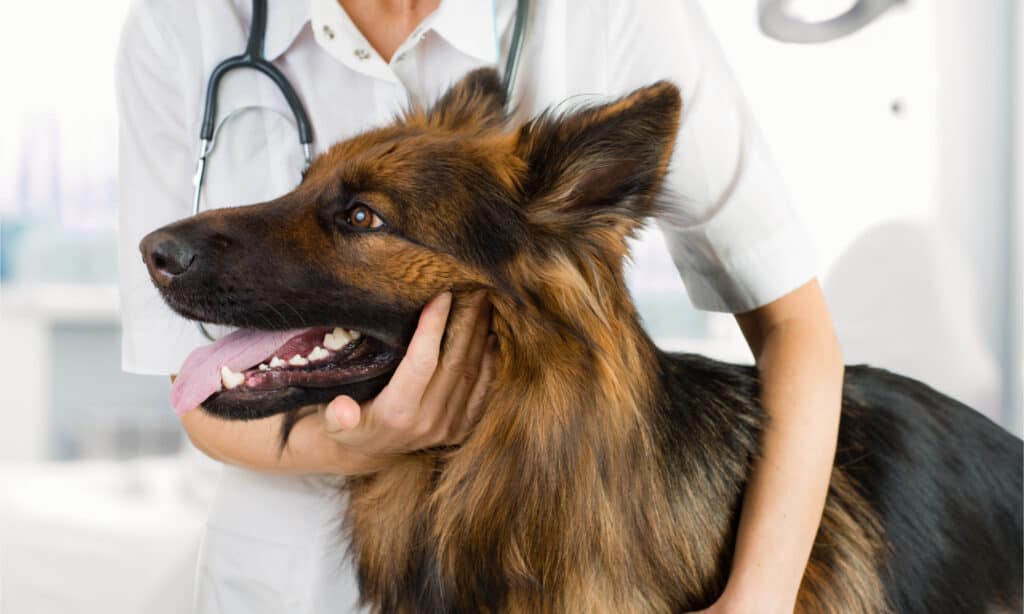German shepherds are frequently seen working as members of the police and military, search-and-rescue teams, and as service dogs. But they also make loyal family dogs. Before bringing a German shepherd puppy into your home, there is much to consider, whether you intend to train them for a job or not. One such factor is the appropriate time to have them spayed or neutered. This decision should be made with the help of research and a certified veterinarian because it can have a lasting impact on your German shepherd’s health. Keep reading to find out when to neuter or spay your German shepherd and the steps to follow before making an appointment.
The Benefits of Neutering and Spaying

Neutering or spaying your German shepherd prevents overpopulation and decreases cancer risks.
©Happy monkey/Shutterstock.com
Knowing the benefits is important as you decide when to neuter or spay your German shepherd. Below are some of the biggest health benefits of both procedures:
- Limits pet overpopulation
- Eliminates the risk of testicular cancer in males
- Reduces the risk of prostate disease and perianal tumors
- Prevents territorial behavior such as aggression, marking, and roaming in males
- Spaying prevents heat cycles and yowling
- Reduces the risk of mammary cancer in females
- Safer and more cost-effective alternative to treating uterine infections like pyometra
Misconceptions About Neutering and Spaying

Neutering and spaying don’t alter your dog’s personality but can help with specific behavioral issues.
©BigDuckSix/iStock via Getty Images
Neutering or spaying your German shepherd won’t completely change their personality. However, the procedures commonly help with some behavioral problems related to mating. Obedience training is the next best step if your German shepherd continues to have behavioral problems after the procedure.
Some purebred dog owners may be concerned about whether they should breed their dogs. But more dogs are waiting in shelters to be adopted than there are people to adopt them. Additionally, there are plenty of professional local breeders.
Finding homes for a new litter isn’t always easy. Sometimes, people change their minds and no longer want the puppy they planned on adopting. As a result, you may take care of more dogs than you can handle, or the puppies can end up in the shelter.
Keep in mind that dogs exclusively living indoors can become pregnant or impregnate another dog despite your best efforts to prevent it. An unneutered or unspayed German shepherd can get loose. Roaming is a bigger risk when they are in heat or searching for a mate. Neutering and spaying are the only ways to eliminate these risks.
When to Neuter or Spay Your German Shepherd

Studies show it’s best to wait until large-breed dogs are at least one year old to neuter or spay them.
©sergio_kumer/iStock via Getty Images
Spaying and neutering dogs is a common practice in the U.S. to reduce the number of animals in the shelter. These procedures commonly take place as soon as a puppy is four to six months old. However, studies show that neutering or spaying as early as possible may not be suitable for all dog breeds.
Understandably, many shelters and veterinarians push early neutering and spaying to help maintain pet population control. Do your research and talk to veterinarians you trust to make a well-informed decision for your German shepherd.
Below are five steps to help you determine when to neuter or spay your German shepherd and what to do when the time comes.
1. Consider Your German Shepherd’s Age
Age is one of the main factors to consider as you plan when to neuter or spay your German shepherd. Large-breed dogs, including German shepherds, should be neutered or spayed when growth stops. Sex hormones like estrogen and testosterone interact with growth hormones to promote proper bone growth.
Most veterinarians recommend spaying a female dog before their first heat cycle to reduce the risk of mammary cancer. But the first heat can occur anywhere between five to 10 months old, so it’s hard to plan. You want to avoid spaying your dog during a heat cycle because it can cause excessive bleeding during the procedure.
Waiting until your German shepherd is between nine to 18 months old allows their bones to mature. However, most German shepherds don’t reach physical maturity until they’re about three years old. Depending on their health, older German shepherds can also be spayed or neutered at any time.
Since the debate about the best age to neuter or spay different dog breeds continues, it’s best to consult your vet about when to neuter or spay your German shepherd to minimize health risks.
2. Know the Risks and Potential Complications
Neutering and spaying are routine procedures. However, some degree of risk is always associated with medical procedures, especially with anesthesia. It’s best to have your German shepherd complete a physical exam and bloodwork to rule out any underlying conditions that can add risk before the procedure.
Neutering or spaying your German shepherd before they turn one can have serious health-related consequences. In fact, it increases the risk of some joint disorders. German shepherds are already at a higher risk for cranial cruciate ligament tears or rupture (CCL), hip dysplasia, and elbow dysplasia.
There is also an increase in certain cancers such as osteosarcoma, hemangiosarcoma, lymphoma, and mast cell tumors as well as urinary incontinence in females. These studies also included golden retrievers and Labrador retrievers, who experienced an increase in the same joint disorders and cancers.
Despite the increased chance of these long-term health conditions, choosing not to neuter or spay your German shepherd also comes with the risk of reproductive infections and cancers. Talk to your vet about the specific risks of your situation to make the best decision on when to neuter or spay your German shepherd.
3. Find a Reputable Veterinarian

Talking to a certified veterinarian will help you decide when to neuter or spay your German shepherd.
©Andrey_Kuzmin/Shutterstock.com
You may live in an area with plenty of veterinarians to choose from. Deciding which one to pick for your German shepherd’s spay or neuter can be challenging. But, doing your research and having a consultation prior to scheduling the procedure can help you find the best choice.
First and foremost, you should ensure the vet you’re considering is registered to practice. You can find accredited veterinarians in your state through the National Veterinary Accreditation Program (NVAP). Online reviews and personal recommendations are also a great way to find a vet that meets your needs.
Word of mouth can give you insight into the practice’s bedside manner. The vet and staff should be interested in your dog’s care and treat them respectfully. The vet should also give you clear information about the procedure to guarantee you’re well-informed.
4. Discuss the Cost
The cost to spay or neuter your German shepherd depends on your area and your dog’s size, weight, and age. Spaying is more complex than neutering, so it typically costs more from the start. However, where you take your dog for the procedure impacts the price.
For instance, a private vet practice is typically more expensive than a low-cost clinic. Some shelters include neuter and spay fees into the adoption fees along with vaccinations and microchipping. As a result, you can expect to pay anywhere from $50-$500 for either procedure. On the other hand, some assistance programs or free pet clinics may offer the procedures for free.
Certain medical conditions such as cryptorchidism – a congenital condition where one or both testes don’t descend into the scrotum – make the procedures more risky and, in turn, more expensive. Additionally, overweight dogs require more anesthesia, increasing the risks and the cost of the procedure.
Most dog owners can plan their German shepherd’s spaying or neutering. However, these procedures can occasionally become an emergency surgery. If your German shepherd has a condition like pyometra, then the procedure can cost hundreds of dollars.
5. Follow Aftercare Instructions
Now you’ve decided when to neuter or spay your German shepherd. The last step is clearing your calendar so you can keep an eye on your dog while they recover. Otherwise, you will need to have another trusted adult watch your dog. You will need to regularly check the incision site. Call the vet immediately if you notice redness, swelling, discharge, a foul odor, discomfort, lethargy, vomiting, or diarrhea.
Your German shepherd must stay calm for 10 to 14 days to recover in a clean, indoor environment. This means restricting play and exercise to short walks while they’re healing. You will also need to prevent them from licking the wound so they don’t cause damage to the incision site or cause an infection. You will most likely need to use a cone and crate them during this time.
Final Thoughts on When to Neuter or Spay Your German Shepherd

Neutering or spaying your German shepherd comes with many long-term benefits and some potential risks.
©josephgruber/iStock via Getty Images
Neutering and spaying are integral to reducing the number of dogs living in shelters and can significantly reduce the possibility of several life-threatening illnesses. But what’s best for your dog may not be the same for another dog. Deciding when to neuter or spay your German shepherd can be accomplished through further research and a detailed discussion with a trusted veterinarian in your area.
The photo featured at the top of this post is © photopix/iStock via Getty Images
Ready to discover the top 10 cutest dog breeds in the entire world?
How about the fastest dogs, the largest dogs and those that are -- quite frankly -- just the kindest dogs on the planet? Each day, AZ Animals sends out lists just like this to our thousands of email subscribers. And the best part? It's FREE. Join today by entering your email below.
Thank you for reading! Have some feedback for us? Contact the AZ Animals editorial team.






